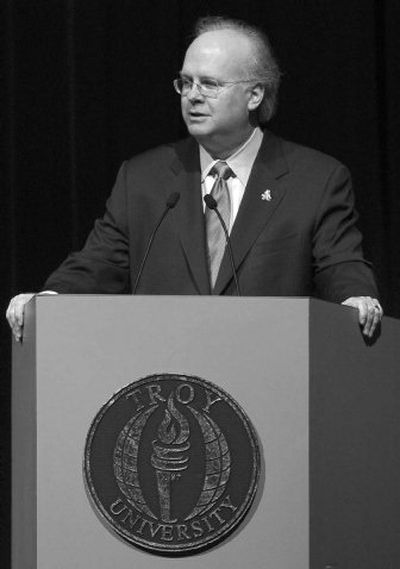Rove, Gonzalez linked to firings

WASHINGTON – Attorney General Alberto Gonzales faced more pressure to resign Thursday as new evidence suggested that he and presidential adviser Karl Rove played bigger roles in developing plans to fire U.S. attorneys than they’ve acknowledged.
Rove has been President Bush’s chief political adviser since Bush’s first campaign for Texas governor, and the latest developments angered members of Congress and created new credibility problems for the administration.
Democrats cited Rove’s involvement as more evidence that the firings were intended to purge prosecutors who refused to let partisan politics influence criminal investigations.
Administration e-mails from early January 2005 show that Rove and Gonzales were directly involved in the initial planning to oust prosecutors who’d fallen out of favor. Recounting in an e-mail a conversation he’d had with Gonzales, aide Kyle Sampson said that they’d decided to replace 15 percent to 20 percent of the 93 U.S. attorneys while retaining those who “are doing a great job, are loyal Bushies, etc.”
At the time, Gonzales was serving as White House counsel while awaiting confirmation to become attorney general. Sampson became his chief of staff at the Justice Department and continued to oversee planning for a mass firing. Sampson resigned earlier this week amid the growing controversy over the dismissals of eight U.S. attorneys last year.
An e-mail from another White House aide said that Rove wanted to know “how we planned to proceed regarding US Attorneys, whether we were going to allow all to stay, request resignations from all and accept only some of them, or selectively replace them, etc.”
The e-mails, which the Justice Department released after the contents were leaked to ABC News, call into question Gonzales’ assertion that he was essentially in the dark about the plans to dismiss federal prosecutors.
Despite expressions of support from Bush, prominent Republicans openly discussed the possibility of Gonzales’ resignation. On Capitol Hill, House of Representatives and Senate committees pressed ahead with their investigations into the firings.
One Republican, Sen. John Sununu of New Hampshire, has publicly urged President Bush to fire Gonzales. Still another GOP lawmaker, this one in the House and not ready to speak out publicly, said Thursday he planned to call next week for Gonzales to step down. And Sen. Gordon Smith, R-Ore., said Thursday that Gonzales had lost the confidence of Congress.
While Gonzales prepared to defend himself, the Senate Judiciary Committee laid the groundwork to subpoena top officials from the Justice Department and the White House if necessary.
The White House downplayed the significance of the e-mails but backed away from earlier statements that the plan to fire all 93 U.S. attorneys originated with former White House counsel Harriet Miers and was swiftly rejected by Gonzales and Rove.
“I do not have the specific answer for you as to whose idea it was,” said White House spokeswoman Dana Perino.
The Justice Department issued a statement saying that Gonzales “has no recollection of any plan or discussion to replace U.S. attorneys while he was still White House counsel.”
In a speech earlier in the day at Troy University in Troy, Ala., Rove dismissed the controversy as “a lot of politics” and said the U.S. attorney firings were proper.
“We’re at a point where people are playing politics with it, and that’s fine,” Rove said.